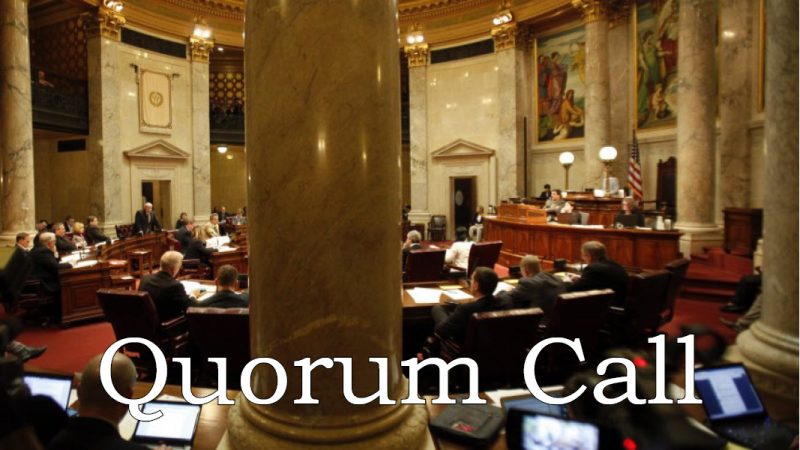The state Senate today approved sweeping changes to Wisconsin’s alcohol policies, using the amendment process to bypass a committee holdup that had prevented the package from coming to the floor.
The Senate added a more than 150-page amendment to a second bill that included provisions on tobacco and alcohol under the Department of Revenue’s authority to move the overhaul of the state’s three-tiered system for producing, distributing and selling alcohol. After it cleared the chamber 21-11, the bill was sent to the Assembly, which passed it 88-10. That cleared the way for the bill to head to the guv.
In moving the bill through the Senate, Majority Leader Devin LeMahieu, a co-sponsor of the bill, went around one of his committee chairs and used a bipartisan coalition to advance the legislation over the objections of several GOP members.
The bill has been awaiting action in the committee chaired by state Sen. Rob Hutton, R-Brookfield, since an August public hearing.
>> WisPolitics is now on the State Affairs network. Get custom keyword notifications, bill tracking and all WisPolitics content. Get the app or access via desktop.
Hutton told WisPolitics ahead of the floor vote he had been planning an exec in December after completing work on amendments to clear the way for the bill to hit the floor after the Legislature reconvenes in January.
Hutton said that would’ve allowed a win-win for the alcohol industry and other parties involved, and that he would’ve preferred that route to today’s move by LeMahieu. Hutton said the majority leader didn’t give him any warning ahead of today’s move, and it wasn’t “preferred, but this caucus is pretty resolute.”
A major sticking point for some lawmakers has been regulations for so-called wedding barns and other private event venues. Now, those renting the venue are allowed to bring in their own alcohol, and no permit is required.
Under the bill, wedding barns would now have to either obtain a license similar to those now acquired by taverns or get a no-sale event venue permit. Venues with that permit would be able to operate no more than six days a year, with a restriction of one event per month.
Opponents argue the provision would put many of the venues out of business due to hurdles to get a Class B license, which allows the holder to sell alcohol.
Rep. Mark Spreitzer, D-Beloit, said it was “shameful” that the Legislature was poised to crack down on wedding barns, accusing his colleagues who backed the bill of doing the bidding of the Tavern League. The state group has for years urged regulations for wedding barns, arguing it was unfair to allow them to operate unlicensed.
“We did not come here to shut down business and interfere with markets in that way. We did not come here to take away options from couples in this way,” Spreitzer said.
No one spoke in favor of the bill during the debate, which included some procedural drama. Senate President Chris Kapenga, R-Delafied, ruled the amendment was non-germane, finding it would substantially expand the scope of the original bill.
SB 268 originally sought only to make changes to several provisions in state law dealing with tobacco and alcohol under the Department of Revenue’s enforcement powers. That includes the definition of fermented malt beverages and the deadline for filing changes to an application or permit to sell alcohol.
The amendment is almost six times longer than the bill itself.
LeMahieu appealed the ruling of the chair, and the chamber overruled Kapenga 19-14. It is rare for either house of the Legislature to overrule the chair. Typically, it’s the minority party challenging those rulings with the majority sticking together to reject them.
Two other efforts to sideline the bill were rejected. The chamber voted 25-8 to override an objection from Sen. Steve Nass, R-Whitewater, to unanimous consent for a third reading on the bill. It then voted 20-13 to reject Spreitzer’s motion to send the bill to the Senate Universities and Revenue Committee, chaired by Hutton.
Nass charged “powerful groups have thrown lots of money at legislators from both sides” prompting the bill to move quickly after it was originally introduced until Hutton slowed it down. He called it “legislative arrogance” for lawmakers to dictate to consumers what their options should be.
“Lobbyists and attorneys wrote the bill. Nothing benefits consumers,” he said.
The amendment would make several tweaks to the alcohol provisions that cleared the Assembly 90-4 in June as part of the standalone bill. It would keep the licensing requirements and the restriction of no more than six events a year for the no-sale permit. But it would also double to two years the time that wedding barns would have to comply with the new licensing requirement.
The amendment also includes several tweaks to give the Department of Revenue more time to implement the changes and to address a concern for home brewers. The revision would allow those coming in from out of state for a competition, for example, to carry into Wisconsin their own beer. Under the previous bill, they’d be barred from doing so.
The Assembly approved the original bill including the changes to the three-tier system 90-4 in June. Today, GOP Reps. Janel Brandtjen, R-Menomonee Falls; Rick Gundrum, R-Slinger; and Chuck Wichgers, R-Muskego; joined seven Dems in voting against the measure.
Rep. Clinton Anderson, D-Beloit, who voted against the bill, argued the bill would be “effectively killing the wedding barn industry.”



